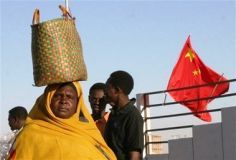UN hopes China will press Sudan on Darfur
Feb 1, 2007 (KHARTOUM) — The United Nations hopes the Chinese president will push for a solution to the Darfur crisis in a landmark visit to Sudan on Friday. But Khartoum expects its staunchest diplomatic ally to stick to boosting commercial ties, particularly for Sudan’s oil.
 The road to Khartoum’s airport was lined with the red banners of communist China and the flag of Sudan’s Muslim fundamentalist regime on Thursday ahead of Hu’s two-day visit, the first by a Chinese president to Sudan.
The road to Khartoum’s airport was lined with the red banners of communist China and the flag of Sudan’s Muslim fundamentalist regime on Thursday ahead of Hu’s two-day visit, the first by a Chinese president to Sudan.
China, which is the biggest foreign investor in Sudan and buys two-thirds of the country’s oil exports, has used its veto-wielding status at the U.N. Security Council to prevent harsh measures against Sudan over the Darfur conflict.
But Beijing has raised expectations that Hu may bring some pressure on Khartoum to show flexibility in ending Darfur’s bloodshed.
In an unusual foray into the field of human rights, Chinese officials ahead of Hu’s visit called on for Sudan to cooperate with the United Nations in finding a solution in Darfur. China usually avoids such public pronouncements under its proclaimed policy of refusing to interfere in what it considers other countries’ internal affairs.
More than 200,000 people have been killed and 2.5 million been chased from their homes in Sudan’s remote western region since 2003, when rebels stemming from ethnic African tribes rose up against the central government. On Thursday, an African Union peacekeeper was killed by unidentified gunmen in a Darfur refugee camp, the 11th peacekeeper to be slain in the conflict.
Sudan has resisted demands it allow U.N. peacekeepers into the region, calling the deployment “neo-colonial.”
Khartoum has sought to keep the focus of Hu’s visit on their booming economic ties. “This visit is going to be a great boost for the distinguished Sudanese-Chinese relations in various fields,” Sudanese President Omar al-Bashir said, according to the official SUNA news agency.
Al-Bashir “commended the various Chinese investments in the Sudan, particularly in the domains of oil, agriculture and dams,” said SUNA after the president met Thursday with the chairman of the Chinese National Petroleum Corp.’s operations in Sudan.
The Sudanese economy grew by 12 percent last year according to the International Monetary Fund. Chinese investment has largely contributed to boost production of the country’s prime resource _ oil _ which has risen to an output of 500,000 barrels a day.
China is also funding large projects such as the US$1.8 billion Merowe hydroelectric complex. Hundreds of Chinese engineers and workers are also believed to be living in Sudan, though China’s embassy was not available to confirm these figures.
“We like it here, it’s promising for business,” said Daisy Wan Chu, an employee at Mr. Wang, one of the flourishing Chinese restaurants that offer a rare alternative to Sudanese cuisine in Khartoum.
Hu’s visit came amid signs that the Sudanese leadership was grudgingly moving toward a compromise deal for U.N. troops to merge with the African force and form a joint peacekeeping mission.
U.N. Secretary-General Ban Ki-moon urged China to help persuade Sudan to accept U.N. peacekeepers during a meeting with Chinese U.N. Ambassador Wang Guangya last week.
“We certainly hope Hu will deploy his substantial influence in order for Khartoum to have a more constructive approach to international efforts,” said Lawrence Rossin of the Save Darfur Coalition, a grouping of humanitarian and rights organizations.
Khartoum is accused of having responded with indiscriminate killings and by unleashing the janjaweed militias of Arab nomads blamed for the worst atrocities in a conflict that the White House and others have labeled genocide.
The government denies these charges, and denounces as neocolonial the U.N. Security Council plan to replace an overwhelmed African Union force in the region with some 22,000 U.N. peacekeepers.
In a phone interview, Rossin pointed to Chinese officials’ recent comments on Darfur and to the fact that news about the crisis are now regularly allowed to appear in China’s government-controlled media as signs that Beijing was changing its position.
Diplomatic circles also sense that China’s patience “is growing thin” with Khartoum on the Darfur issue, said Sudan expert Colin Thomas-Jensen of the International Crisis Group, a New York-based think tank.
He said China gave the impression it now wanted to become “part of the solution” to the crisis in Darfur.
“But if Sudan follows its usual pattern of saying yes to the international community and then doing no, we don’t know how China will react,” he said.
(AP)
